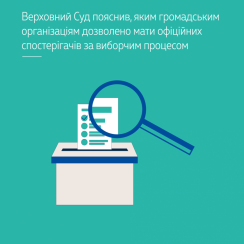Contact center of the Ukrainian Judiciary 044 207-35-46
ABOUT THE SUPREME COURT
FOR CITIZENS
ACTIVITY
PRESS-CENTER

Existence of such activity as observation of the electoral process in the statute of a civil organization is one of the requirements to civil organizations to have their observers at the elections (Part 2 of Article 69 of the Law No. 474-XIV “On the Elections of the President of Ukraine”).
This is the opinion of the Supreme Court resulting from the consideration of appeal in the case under the claim of Batkivshchyna Moloda (Young Moterland) civil organization to the Central Election Commission (hereinafter – CEC).
The civil organization appealed the Resolution of the CEC No. 94 of 22 January 2019, in which, particularly, Batkivshchyna Moloda civil organization was refused to have official observers at the regular elections of the President of Ukraine on 31 March 2019, since the issue of observation of the electoral process is not referred to the statutory activity of this organization.
In the plaintiff’s opinion, such CEC’s approach is the demonstration of excessive formalism.
Court of first instance dismissed the claim. The Supreme Court confirmed this judgment.
The Supreme Court represented by the panel of judges of the Administrative Cassation Court remarked that pursuant to Part 2 of Article 69 of the Law No. 474-XIV “On the Elections of the President of Ukraine”, civil organization, the statutory activity of which includes issues of the electoral process and observance of it, registered in accordance with legally established procedure, may apply to the Central Election Commission with a motion on the permission to have official observers while holding the elections of the President of Ukraine at the latest sixty days before the elections day.
The clarification of the essence of the statutory activity of a certain civil organization as a precondition for its participation in this process (by means of observance) is possible only on the grounds of its constituent instrument – the statute.
The panel of judges paid attention to the fact that it was noted in the Statute of Batkivshchyna Moloda civil organization that it actively participated in electoral campaigns to achieve the statutory aim and to execute the statutory tasks. At the same time, the Court explained that the concepts “electoral campaign” and “electoral process and observance of the elections” are not identical ones.
Therefore, the CEC reasonably refused to provide the plaintiff with the permission to have observers on the electoral process on the ground of the fact that its statutory activity did not meet the requirements of the noted article.
To see the full text of the Resolution of the Supreme Court of 29 January 2019 in the case No. 855/11/19 (administrative proceedings No. À/9901/10/19), please, follow the link of the Unified State Register of Judgments.